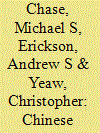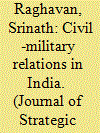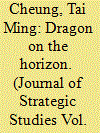| Srl | Item |
| 1 |
ID:
086250


|
|
|
|
|
| Publication |
2009.
|
| Summary/Abstract |
How states assess the capabilities of their adversaries and rivals is of paramount importance to the theory and practice of international relations. This paper presents a framework for understanding why states overestimate the capabilities of their adversaries. Three types of overestimation are presented, consisting of conscious/rational, erroneous and biased overestimation. In order to demonstrate the phenomenon of biased overestimation in international politics, the case of the 'Missile Gap' (1957-61) controversy in the United States is examined.
|
|
|
|
|
|
|
|
|
|
|
|
|
|
|
|
| 2 |
ID:
086249


|
|
|
|
|
| Publication |
2009.
|
| Summary/Abstract |
The People's Republic of China (PRC), no longer content with its longstanding 'minimalist' nuclear posture and strategy, is enhancing the striking power and survivability of its theater and strategic missile forces and rethinking its nuclear doctrine in ways that may pose serious challenges for the United States. Although the modernization of Chinese nuclear and missile forces may ultimately result in greater strategic deterrence stability, this change will not come about immediately or automatically. Indeed, it is entirely possible that China's growing missile capabilities could decrease crisis stability under certain circumstances, especially in the event of a US-China conflict over Taiwan.
|
|
|
|
|
|
|
|
|
|
|
|
|
|
|
|
| 3 |
ID:
086253


|
|
|
|
|
| Publication |
2009.
|
| Summary/Abstract |
The pattern of civil-military interaction in India is informed by the notion that civilians should refrain from involvement in operational matters. The emergence of this trend can be traced back to the defeat against China in 1962. In its aftermath, the belief that the debacle occurred because of civilian interference took hold. Thereafter, politicians restricted themselves to giving overall directives, leaving operational matters to the military. The Indian 'victory' in the subsequent war with Pakistan was seen as vindicating this arrangement. This essay argues that the conventional reading of the China crisis is at best misleading and at worst erroneous. Further, it contends that the subsequent war with Pakistan actually underscores the problems of civilian non-involvement in operational issues. The historical narrative underpinning the norm of civilian abstention is at the very least dubious.
|
|
|
|
|
|
|
|
|
|
|
|
|
|
|
|
| 4 |
ID:
086248


|
|
|
|
|
| Publication |
2009.
|
| Summary/Abstract |
China's grand ambition is to become a world-class military industrial power by 2020, but can it succeed? A concerted restructuring of the defense industry is taking place to tackle deep-seated obstacles constraining its ability to absorb, create and diffuse technological innovation. This includes promoting competition and creativity by reducing the reach of the state and encouraging enterprises to play a leading role, developing a robust regulatory and standards regime to provide benchmarks and rules, and forging integration between the civilian and military portions of the economy through spin-ons.
|
|
|
|
|
|
|
|
|
|
|
|
|
|
|
|
| 5 |
ID:
086247


|
|
|
|
|
| Publication |
2009.
|
| Summary/Abstract |
While terrorist attacks are, by their very nature, surprise attacks, they are rarely studied as such. There have been few attempts to integrate knowledge and insight from the extensive bodies of literature on military surprise attack and terrorism. This article proposes a framework for understanding the relationship between the mechanism of surprise and the method of terrorism. It seeks to situate the principle of surprise within the tactical and strategic logic of terrorism in order to illuminate the role of surprise as the terrorist's tactical mechanism of necessity and his strategic weapon of choice. Applying this framework to the 9/11 case will further illustrate the central role of surprise in terrorism.
|
|
|
|
|
|
|
|
|
|
|
|
|
|
|
|